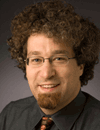Brian Kirby
Associate Professor, Cornell UniversityBrian J. Kirby currently directs the Micro/Nanofluidics Laboratory in the Sibley School of Mechanical and Aerospace Engineering at Cornell University, following several years as Senior Member of the Technical Staff in the Microfluidics Department at Sandia National Laboratories in Livermore, California. Professor Kirby has received a 2002 R&D Top 100 Invention award for work on microvalves for high pressure-fluid control, a 2004 JD Watson Investigator award for microdevices for protein production and analysis, and a 2006 Presidential Early Career Award for Scientists and Engineers (PECASE) award for nanoscale electrokinetics and bioagent detection. |  | | | Thomas Laurell
Professor, Lund UniversityThomas Laurell is Professor in Medical and Chemical Microsensors at Lund University. Laurell has a background in engineering with a focus on biomedical technology, with a PhD from the technical faculty at Lund University. Laurell has 20 years experience in the development of lab-on-a-chip based bioanalytical and medical diagnostic technology. He was appointed distinguished professor at dept. Biomedical Engineering at Dongguk University, Seoul, Korea in 2009.
Laurell is a member of Royal Swedish Academy of Sciences, of Royal Swedish Academy of Engineering Sciences and Royal Physiographic Society. He has received several prestigious awards such as the The AkzoNobel Science Award in 2009 for his ground breaking interdisciplinary research, Wallmark Award by The Royal Swedish Academy of Sciences for his microsensorsystem innovations in 2006, SKAPA Award in memory of Alfred Nobel – for the best innovation of the year in Sweden 1996 and 2003, and Erna Ebelings Price for outstanding research in microfluidics and biomedical engineering in 2006. He is founder of four start-up companies. Laurell is also the President of the Chemical and Biological Microsystems Society (www.cbmsociety.org). |  | | | Christoph Merten
Principal Investigator, European Molecular Biology LaboratoryChristoph A. Merten (merten@embl.de) studied biochemistry at the University of Frankfurt and obtained his PhD on directed evolution of retroviral vectors at the Paul Ehrlich Institute in Langen, Germany. Subsequently he did a postdoc at the MRC Laboratory of Molecular Biology in Cambridge (UK), focussing on in vitro compartmentalization techniques. In 2005 he moved to the Institut de Science et d'Ingénierie Supramoléculaires (ISIS) in Strasbourg, France, where he became a junior group leader in 2007. Christoph joined the European Molecular Biology Laboratory in Heidelberg, Germany, as a Principal Investigator in 2010, where his group focusses on miniaturizing biology and chemistry in microfluidic systems. |  | | |
|

 Add to Calendar ▼2013-06-06 00:00:002013-06-07 00:00:00Europe/LondonNano and MicrofluidicsSELECTBIOenquiries@selectbiosciences.com
Add to Calendar ▼2013-06-06 00:00:002013-06-07 00:00:00Europe/LondonNano and MicrofluidicsSELECTBIOenquiries@selectbiosciences.com